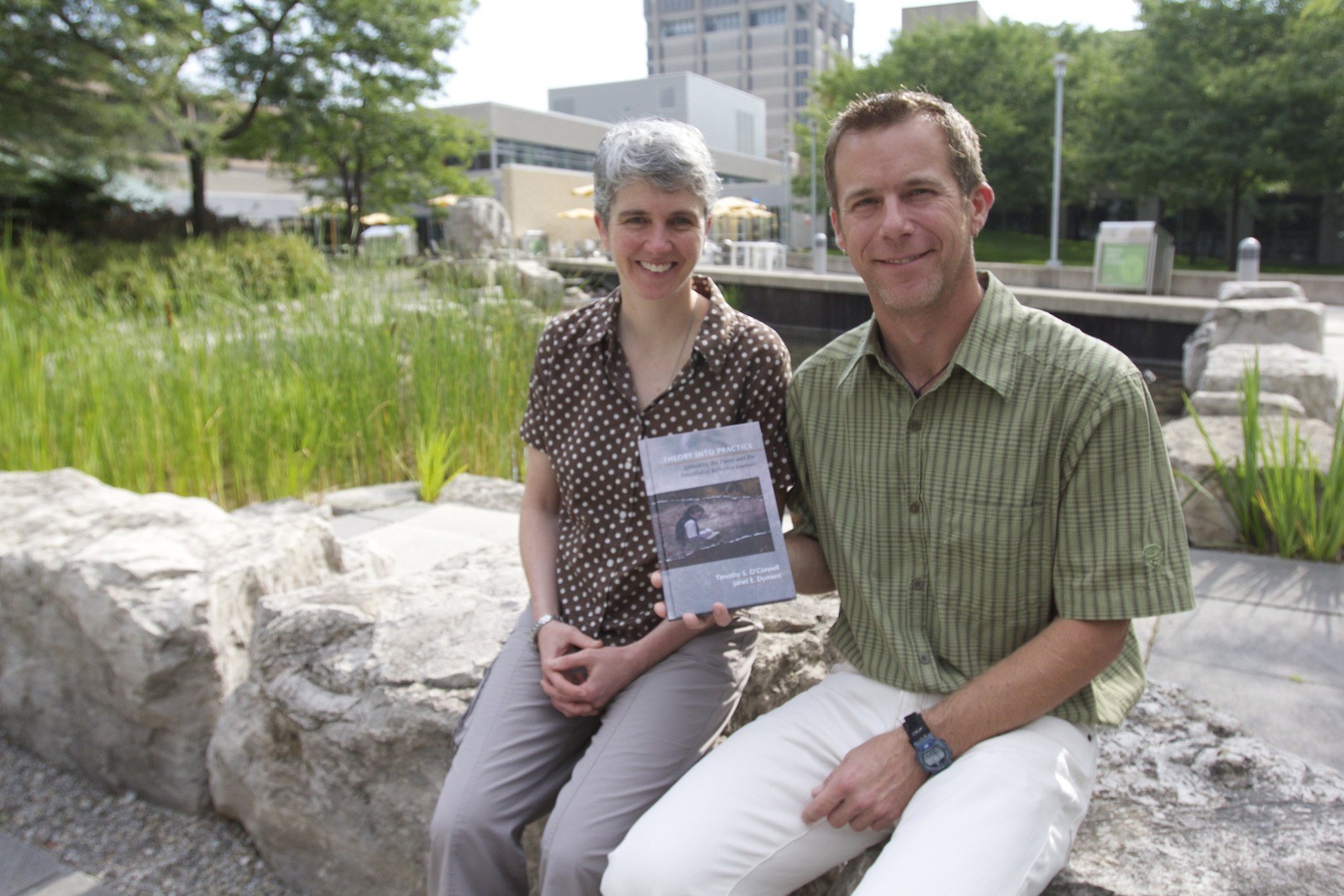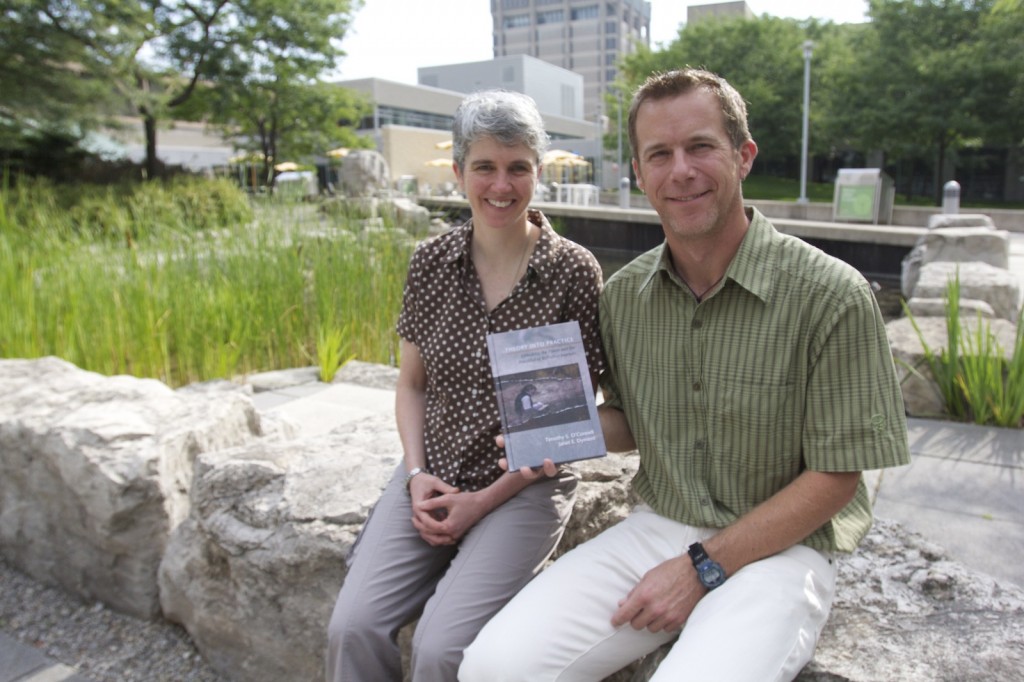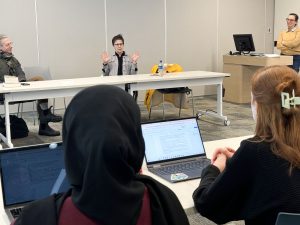 Tim O'Connell, professor and chair of the Department of Recreation and Leisure, and Janet Dyment, a senior lecturer in the Faculty of Education at the University of Tasmania, have published a new book for edcuators about reflective journaling.
Tim O'Connell, professor and chair of the Department of Recreation and Leisure, and Janet Dyment, a senior lecturer in the Faculty of Education at the University of Tasmania, have published a new book for edcuators about reflective journaling. 
Tim O'Connell, professor and chair of the Department of Recreation and Leisure, and Janet Dyment, a senior lecturer in the Faculty of Education at the University of Tasmania, have published a new book for edcuators about reflective journaling.
It’s something Tim O’Connell and Janet Dyment have been reflecting on for years.
Reflective journaling has inspired the duo to produce more than a dozen peer reviewed research papers over the past 12 years, all of it culminating with O’Connell and Dyment’s newly published book Theory into Practice: Unlocking the Power and the Potential of Reflective Journals.
It’s a book written for higher education instructors, pre-service and high school teachers, and outdoor educators to turn them on to the power of their students putting pen to paper and writing down their thoughts.
The point is to encourage students to critically reflect on what they’re learning at school and connect those lessons to their everyday lives.
“It’s putting the pieces together of what’s happening inside the classroom and outside,” explained O’Connell, professor and chair of Brock’s Department of Recreation and Leisure Studies.
O’Connell and Dyment, a senior lecturer in the Faculty of Education at the University of Tasmania, have both been avid journal writers throughout their lives.
“As kids, we recall keeping secret journals that were hidden away from our siblings and friends,” they wrote in Theory into Practice. “As teenagers, we remember writing in journals to sort out the angst and tensions of changing emotions, bodies, hearts and thoughts.
“As young practitioners in the field of outdoor education… we kept journals of our expeditions, adventures, students and learnings. We both have boxes of these old journals, stored in our homes – and enjoy a quiet moment every few years to peek back into those time capsules.”
O’Connell and Dyment met while teaching at Lakehead University’s School of Outdoor Recreation, Parks and Tourism, and connected over their mutual interest in journal writing as a teaching tool.
Both lamented that the journal entries they received from their students lacked “reflection, critique and engagement.” Instead, the pages were filled with descriptive accounts of events.
So the duo began researching the art of reflective journaling, its benefits, how to support and train students to become better at chronicling their thoughts, and helping them to find their own voice.
They boned up on other academic writing about the topic to gauge the unknowns about journaling, held journal writing workshops, interviewed students and instructors and, as part of their research, analyzed more than 880 journal entries from students.
Then they reflected.
They spent six months synthesizing their findings, including their own previous research, then planned the manuscript for Theory into Practice, ensuring they tailored the book to suit the needs of both academics and practitioners.
The result is a book that’s both a mix of theory and practical concepts but it’s one that doesn’t necessarily need to be read page by page.
“We tried to write each chapter so if someone is just interested in a particular component of journaling, they could just read that chapter,” O’Connell explained.
“The book is written to be of interest to a range of readers, irrespective of their academic discipline,” Dyment added.
While both O’Connell and Dyment are big advocates of journaling and use it as a teaching tool in their own classes, they acknowledge it’s something that should be used with care.
“You don’t want to journal students to death and you can’t just hand them a blank journal and expect success,” Dyment said. “Students need proper training and scaffolding.”
Still, they say the practice of keeping a reflective journal related to learning means students are better able to integrate theory and practice so what they learn “becomes something deeper and richer for them,” Dyment noted.
It also serves as a sort of recordkeeping of experiences for students, which can come in handy during job interviews, for example.
With the book fresh off the press, O’Connell and Dyment are continuing their research into journaling, including examining why more experienced educators may have stopped journaling, what tools they’re using to reflect instead, and how they reconcile their lack of journaling with using it as a teaching tool.
They are also looking into how social media platforms, including Facebook, Twitter, blogs, electronic portfolios and discussion boards can be used to support students’ reflective journaling efforts.









